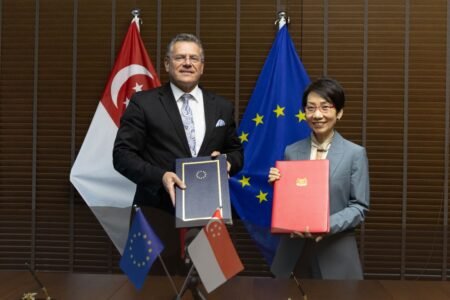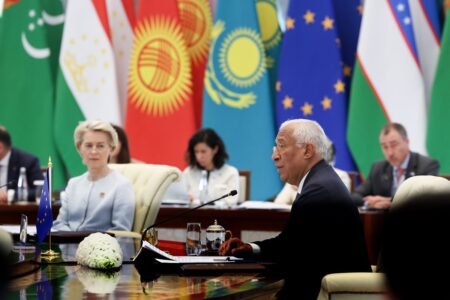The European Union has launched a second challenge of China’s export restrictions on raw materials including 17 rare earths, as well as tungsten and molybdenum. Together with the US and Japan, the EU formally requested dispute settlement consultations with China in the World Trade Organisation (WTO). This follows a successful EU challenge at the WTO on similar restrictions for other raw materials earlier this year.
Advertisement
Which raw materials are at issue in this case?
Raw materials covered by this case are various forms of rare earth elements (REE), molybdenum and tungsten.
REE are a set of 17 chemical elements in the periodic table, specifically the 15 lanthanides (lanthanum, cerium, praseodymium, neodymium, promethium, samarium, europium, gadolinium, terbium, dysprosium, holmium, erbium, thulium, ytterbium, lutetium) plus scandium and yttrium.
Which industries are most concerned by the current case?
Restrictions on these materials cause concern for many European industries, including high-tech producers of cars components, computers, cameras, mobile phones, flat panel screens, as well as “green” products such as wind turbines, catalysers, electric and hybrid vehicles, energy-saving bulbs.
What is the link between this new case and the first raw materials case?
The WTO has just ruled in favour of the EU and its co-complainants, the US and Mexico in a first challenge against China’s export restrictions on various raw material. This first dispute, launched in 2009, covered similar export restrictions as today’s challenge but on a different set of raw materials, namely bauxite, coke, fluorspar, magnesium, manganese, silicon metal, silicon carbide, yellow phosphorous and zinc. Both, the WTO Panel and Appellate Body confirmed the EU’s claims and the final reports were adopted by the WTO Dispute Settlement Body on 22 February this year. China now needs to bring its measures into compliance with this ruling. However, while this first dispute should inform China more generally on the incompatibility of its export restrictions regime, it entails a formal compliance obligation only with regard to the specific materials challenged.
Despite this recent ruling, China has not sent any signals that it would remove its wider export restrictions. To the contrary, the latest rare earth quota announcements are further tightening the restrictions and are a clear signal in the wrong direction. Therefore, the EU decided to launch a further challenge on rare earth elements, tungsten and molybdenum. The EU very much hopes that these WTO consultations will lead to a satisfactory solution with China.
What is the economic impact of this case?
Export restrictions create serious disadvantages for foreign producers by artificially increasing China’s export prices and driving up world prices. At the same time, such restrictions artificially lower China’s domestic prices for the raw materials due to significant increases in domestic supply. This gives China’s domestic downstream industry significant competitive advantages and puts pressure on foreign producers to move their operations and technologies to China, which in turn results in losses of employment and production capacities in the EU.
The Chinese restrictions can lead to losses of employment and production capacities in Europe. These policies stand at odds with the non-discriminatory trade framework that WTO members, including China, have signed up to.
How have the export restrictions evolved and what are their effects?
China has gradually tightened its export restrictions on rare earths materials by raising export taxes and drastically reducing the export quota. In June 2010, the Chinese authorities have implemented a drastic reduction of the quota by 32% for domestic companies and 54% for foreign-invested companies. It also caused the supply to the rest of the world to fall way behind demand (30.000t of quota destined for export vs. 50-60.000t of demand). Quota figures for 1st semester 2011, showing a further decrease of 35% in allowed exports amounts, compared to the same semester of 2010 (with a slightly deeper cut for foreign invested players than for Chinese exporters).
Those restrictions undoubtedly affected the prices. Sharp price increase started for many elements in mid-2010 (first tightening of the quota).This follows an absolute price peak for all elements in first half of 2011: most prices went up by 500%-1000%. In mid-2011, prices corrected downwards due to obstructed demand although, still, prices remain much higher than in 2009. China export prices are up to 100% higher compared to domestic prices.
Due to the restrictions and price hikes the EU industry had to drop manufacturing of some of their products, various businesses had to relocate to China, consumer prices of many REE-based goods went up, and uncertainty in downstream sectors on cuts of the supplies leaves the industry unstable.
What happens next?
A request for consultations is the first step in the WTO dispute settlement process.
The EU has raised the issue with China repeatedly over the past years without success, and now hopes to use the WTO consultation process to arrive at a mutually satisfactory solution with China. If no satisfactory solution is being found, the dispute can be transmitted to a WTO Panel for its ruling.
Source: European Commission







